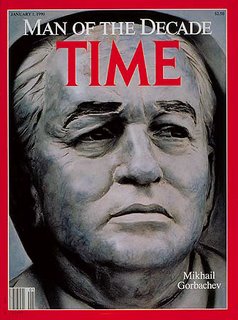Saturday, July 22, 2006
Gorbachev urges Howard to sign Kyoto now

Mikhail Gorbachev, the Soviet president who dismantled the USSR and put an end to the Cold War with the USA, has urged Australia to sign the Kyoto Protocol on climate change and set targets to cut greenhouse gas emissions. He also called on Canberra to influence the United States to do more. Mr Gorbachev said the close relationship between Prime Minister John Howard and US President George W Bush gave Australia influence. He was in Australia in July 2006 to co-chair the global forum Earth Dialogues, where delegates from 11 nations discussed solutions to sustainable development, resource management, climate change, energy security and peace.
Mr Gorbachev is chairman of environmental lobby group Green Cross International. Under Kyoto 40 countries agreed to cut their emissions by 5.2% before 2012. Prime Minister John Howard turned down invitations to attend the forum, as did four other ministers.
Monday, July 17, 2006
Prime Minister "discourages" farmers on carbon
Australia could become an 'energy superpower', selling coal and oil to an energy hungry world. Renewable energy is too expensive, so nuclear is likely to become mainstream in Australia. And carbon credits are not on the horizon for anyone in Australia. This is the conclusion from Mr Howard's speech to the Council for the Economic Development of Australia on 17 July, 2006.
"Clean coal" and nuclear are the future, he says, both playing to Australia's strengths. And Kyoto is not for signing, he says, because companies would leave Australia if it signed.
"This is a very discouraging message from our national leader," says Michael Kiely, Convenor of the Carbon Coalition.
"Surely Mr Howard has been badly advised by public servants. ABC 4Corners revealed how the coal industry had been given unusual free access to influence energy policy, even to the extent of writing the Department's Cabinet submissions," he says.
The Prime Minister's speech writers have made some glaring errors, says Mr Kiely. "Fancy having the Prime Minister make a statement such as that companies would leave Australia if we signed Kyoto. Where could they go? The rest of the world has signed, except the USA, and most observers believe it will sign when the new Administration is sworn in. Big companies here like Westpac, IAG and Origin Energy are asking for Kyoto."
The Carbon Coalition will be lobbying the Prime Minister to ask him to consider the opportunity for Australian farmers and the natural resource base if soil carbon credits can be traded. It will also be lobbying the Kyoto signatories to ask them to allow Australian farmers to trade on the European Climate Exchange.
"Clean coal" and nuclear are the future, he says, both playing to Australia's strengths. And Kyoto is not for signing, he says, because companies would leave Australia if it signed.
"This is a very discouraging message from our national leader," says Michael Kiely, Convenor of the Carbon Coalition.
"Surely Mr Howard has been badly advised by public servants. ABC 4Corners revealed how the coal industry had been given unusual free access to influence energy policy, even to the extent of writing the Department's Cabinet submissions," he says.
The Prime Minister's speech writers have made some glaring errors, says Mr Kiely. "Fancy having the Prime Minister make a statement such as that companies would leave Australia if we signed Kyoto. Where could they go? The rest of the world has signed, except the USA, and most observers believe it will sign when the new Administration is sworn in. Big companies here like Westpac, IAG and Origin Energy are asking for Kyoto."
The Carbon Coalition will be lobbying the Prime Minister to ask him to consider the opportunity for Australian farmers and the natural resource base if soil carbon credits can be traded. It will also be lobbying the Kyoto signatories to ask them to allow Australian farmers to trade on the European Climate Exchange.
Saturday, July 15, 2006
Government policy against soil C credits
A research paper called "National and International Policies Affecting the Demand for Soil Carbon Sequestration" reveals how US Government Policy stands in the way of Soil C Credits. The paper by Linda Young, Senior Research Scientist in the Department of Agricultural Economics and Economics, Montana State University, gives an overview of the various climate change policies currently in place or being discussed around the world. It discusses how these various policies affect the market for carbon trading and the demand for soil carbon sequestration.
She concludes: "U.S. markets for agricultural carbon sequestration services will likely be small unless there is a change in U.S. federal climate-change policy. The Bush administration's climate-change policy establishes emissions reductions at roughly the same pace that they have occurred over the past twenty years due to technological advances. Current U.S. policy is likely to keep demand for carbon credits weak in the United States and given that the United States cannot export carbon credits to entities in countries that have ratified the Kyoto Protocol, international demand for U.S. carbon credits will remain weak as well. As a result, there is little impetus to overcome the verification and measurement challenges the market would require for agricultural sequestration services. State programs are strengthening demand for carbon credits, but at the cost of complying with a myriad of requirements for business that vary by state.
"The development of the carbon market would be facilitated by the emergence of a seamless market with one set of rules for those demanding and supplying carbon credits. Market demand for agricultural sequestration services is likely to remain weak."
Australia's federal government policy follows US policy in lockstep.
See the full paper, with references, at: http://www.oznet.ksu.edu/ctec/CASMGSnewsletter/Dec03-2.htm
She concludes: "U.S. markets for agricultural carbon sequestration services will likely be small unless there is a change in U.S. federal climate-change policy. The Bush administration's climate-change policy establishes emissions reductions at roughly the same pace that they have occurred over the past twenty years due to technological advances. Current U.S. policy is likely to keep demand for carbon credits weak in the United States and given that the United States cannot export carbon credits to entities in countries that have ratified the Kyoto Protocol, international demand for U.S. carbon credits will remain weak as well. As a result, there is little impetus to overcome the verification and measurement challenges the market would require for agricultural sequestration services. State programs are strengthening demand for carbon credits, but at the cost of complying with a myriad of requirements for business that vary by state.
"The development of the carbon market would be facilitated by the emergence of a seamless market with one set of rules for those demanding and supplying carbon credits. Market demand for agricultural sequestration services is likely to remain weak."
Australia's federal government policy follows US policy in lockstep.
See the full paper, with references, at: http://www.oznet.ksu.edu/ctec/CASMGSnewsletter/Dec03-2.htm
Thursday, July 06, 2006
Senate pleads with Bush: "Be a leader. Cap and Trade!"
 CAPTION: The US Senate says President George W. Bush is not a visionary when it comes to his country's future in a carbon-conscious world.
CAPTION: The US Senate says President George W. Bush is not a visionary when it comes to his country's future in a carbon-conscious world..................
On 29 June, 40 US senators, including prominent Republican leaders, sent an urgent letter to President Bush. "Provide leadership on climate change," they said or the US could lose its competitive edge in a "carbon conscious" world. They want a mandatory cap and trade system whereby companies will have to buy carbon credits to offset the CO2 and other gases they are emitting into the atmosphere.
A year ago, the Senate passed a resolution calling for a mandatory federal programme to reverse global warming.
In other words, they wanted a cap and trade system. Nothing happened, so they are pleading with him again. Bush is a global warming skeptic. He has only recently agreed it is real. He doesn't accept its man made. (He career in the oil industry, one of the biggest polluters that would be forced to buy offsetting credits, has been offered as an explanation for his reluctance.) The Bush Administration's own scientists have proven climate change is linked to human influences.
The 40 Senators make an appeal on economic grounds: "It is important to keep US businesses competitive in a carbon-conscious global marketplace. Since we have not given them a clear signal to reduce global warming pollution, American businesses continue to make long-term capital investments that commit us to ever-increasing global warming emissions. Our inaction has discouraged the deployment of existing technologies and development of new technologies."
America will be a backwater, they warn, as "foreign companies are advancing innovative designs and patents in photovoltaics, auto technology, wind and efficient buildings".
"We urge you to provide leadership on this critical issue..."
Several bills are before Congress, including the Strong Economy & Climate Protection Act, which would cap emissions from large polluters. Republican Sen. John McCain says he will re-introduce the Climate Stewardship Act, which would cap greenhouse gas emissions. The President is becoming increasingly irrelevant to this process.
It will be revealing looking back from 2040 at the impact on America's subsequent history of the incumbency of this moderately intellectually-challenged President and his ideological fundamentalism. Will the history books list is as one of the major factors in the Decline and Fall of the American Empire.
Australian farmers are blocked from receiving full value for the carbon they sequester by the refusal of President Bush to mandate cap and trade and the way the Commonwealth Government in Australia takes its cues from the US.
CRC for Greenhouse Accounting closed
The Cooperative Research Centre for Greenhouse Accounting, opened in 1999, has been closed. The Centre has not been re-funded. The Centre's website